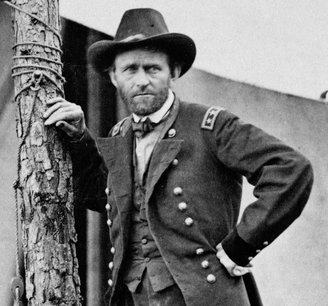“…the
lack of an ability to compromise led to the Civil War.”
— John Kelly, White House Chief of Staff, October 30 2017
“There would be those who would say the reason for the Civil War was over slavery. No. It was over states’ rights.”
— Pat Hardy, member of the Texas Board of Education, 2010
###
As a furriner, and a limey to boot, I hesitate to say anything about the US Civil War, aka The War Between States, the four-year, three-quarters-of-a-million deaths conflict that ended at Appomattox 152 years ago. However, since this country has much to say about just about every other country (or would-be country — see Kurdistan), I’m wading in after reading the alt-facts comments by General Kelly, supposedly the voice of reason in the White House. Plus, I’m a citizen. Here’s my take: Slavery was the cause of the Civil War.

White House Chief of Staff John F. Kelly. (Public domain).
Only slightly more nuanced, Ken Burns tweeted: “Many factors contributed to the Civil War. One caused it: slavery.”
A month after the election of Abraham Lincoln as President, catalyst state South Carolina kicked off secession, and hence the war, with its “Declaration of the Immediate Causes Which Induce and Justify the Secession of South Carolina from the Federal Union.” Primary focus of the declaration was that the Northern states had failed to “fulfill their constitutional obligations,” in particular the obligation to return runaway slaves as set out in Article IV, Section 2 of the US Constitution:
“No person held to service or labor in one State, under the laws thereof, escaping into another, shall, in consequence of any law or regulation therein, be discharged from such service or labor, but shall be delivered up, on claim of the party to whom such service or labor may be due.”
Additionally (it’s a long document!), the non-slaveholding states “… have denounced as sinful the institution of slavery; they have permitted open establishment among them of societies, whose avowed object is to disturb the peace and to eloign the property of the citizens of other States. They have encouraged and assisted thousands of our slaves to leave their homes; and those who remain, have been incited by emissaries, books and pictures to servile insurrection.”
Despite later interpretation (see above), there’s no mention in the declaration of states’ rights, tariffs or taxes.
Mississippi followed S.C. two weeks later with its own declaration: “Our position is thoroughly identified with the institution of slavery — the greatest material interest of the world. Its labor supplies the product which constitutes by far the largest and most important portions of the commerce of the earth … A blow at slavery is a blow at commerce and civilization.”
###
I’m going into all this detail because of the me-too comments made by White House Press Secretary Sarah Huckabee Sanders the morning after Kelly’s “lack of an ability to compromise” interview. Instead of softening his stance, she doubled down, telling reporters there was “historical documentation” to support his claim. Pressed about Kelly’s “compromise” statement, she huffily replied, “I’m not going to get up here and relitigate the Civil War.”
You’ve got to wonder what Kelly and Huckabee Sanders meant. The US government had tried compromise, over and again, each time perpetuating slavery. For example:
- The 1787 Three-Fifths Compromise which determined that enslaved black people would count as 3/5 of a person for purposes of representation (while not, of course, granting them any rights).
- The Missouri Compromise in 1820 that maintained the balance between slave states and free states.
- The Kansas-Nebraska Act (replacing Missouri) leaving the question of slavery up to individual states.
- The Compromise of 1850 that prohibited slave trading in Washington DC, but also compelled Northerners to return fugitive slaves.
Not incidentally, and despite his personal misgivings, the Great Emancipator himself would have compromised to save the Union. Before the war, he offered to allow slavery to continue where it already existed, but to prohibit its extension in new territories — which didn’t satisfy the slave-holding Southern planters. In 1862 he wrote editor Horace Greeley, “If I could save the Union without freeing any slave I would do it, and if I could save it by freeing all the slaves I would do it; and if I could save it by freeing some and leaving others alone I would also do that.”
Back to Kelly and Huckabee Sanders. What it sounds like they were saying is that the US should have compromised yet again while allowing—yet again—slavery to continue.
###

Grant at Cold Harbor, 1864 (Edgar Guy Fawx, public domain)
This is all especially painful in the light of the racist remarks from Kelly’s and Huckabee’s boss following last August’s clashes in Charlottesville over the planned removal of a statue of Robert E. Lee. Following the death of a protester, Trump implied that neo-Nazis and KKK white supremacists were on an equal footing with left-wing demonstrators, saying that the violence was attributable to “both sides” and that there were “some very fine people” among those carrying flaming torches and swastika flags while chanting “Jews will not replace us.”
I’ll leave (Fort Humboldt’s) Ulysses S. Grant, who was in the thick of the war — during and after — to have the last word. In his memoirs (written while he was dying, wracked with throat cancer), he reminisced on Lee’s surrender of the Army of Northern Virginia at Appomattox. (My italics.)
“What General Lee’s feelings were I do not know … but my own feelings, which had been quite jubilant on the receipt of his letter, were sad and depressed. I felt like anything rather than rejoicing at the downfall of a foe who had fought so long and valiantly, and had suffered so much for a cause, though that cause was, I believe, one of the worst for which a people ever fought, and one for which there was the least excuse.”
CLICK TO MANAGE